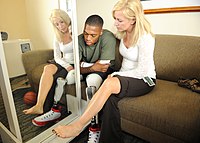
Impairment from key lower limb antagonists vs. ambulation speed in chronic hemiparesis
Sign Up to like & getrecommendations! Published in 2017 at "Annals of Physical and Rehabilitation Medicine"
DOI: 10.1016/j.rehab.2017.07.019
Abstract: Objective In hemiparesis, three main motor mechanisms in lower limb produce ambulation impairment: paresis in agonists and contracture and overactivity in antagonists. The present study explores correlations between ambulation speed and indices of contracture, spasticity,… read more here.
Keywords: chronic hemiparesis; lower limb; ambulation speed; hemiparesis ... See more keywords

Trunk muscle strength and endurance assessed by two methods in the isokinetic dynamometer for able-bodied and post-stroke hemiparesis people
Sign Up to like & getrecommendations! Published in 2018 at "Annals of Physical and Rehabilitation Medicine"
DOI: 10.1016/j.rehab.2018.05.1060
Abstract: Introduction/Background Trunk muscular function has been identified as an early predictor of health-related outcomes post-stroke, revealing unbalance on both sides changing muscular response in the axis of the body. Then, we aimed to compare the… read more here.
Keywords: post stroke; strength; strength endurance; hemiparesis ... See more keywords

The evaluation of non-use of the upper limb in chronic hemiparesis is influenced by the level of motor impairment and difficulty of the activities–proposal of a new version of the Motor Activity Log
Sign Up to like & getrecommendations! Published in 2018 at "Physiotherapy Theory and Practice"
DOI: 10.1080/09593985.2018.1460430
Abstract: ABSTRACT This study aims to evaluate the influence of the degree of difficulty of the activities in Motor Activity Log (MAL) scores for patients with mild, moderate, and severe hemiparesis, and to estimate the correlation… read more here.
Keywords: motor impairment; difficulty activities; motor; upper limb ... See more keywords

A framework for quantifying the effects of transcranial magnetic stimulation on motor recovery from hemiparesis: corticomuscular network
Sign Up to like & getrecommendations! Published in 2022 at "Journal of Neural Engineering"
DOI: 10.1088/1741-2552/ac636b
Abstract: Objective. Transcranial magnetic stimulation (TMS) is an experimental therapy for promoting motor recovery from hemiparesis. At present, hemiparesis patients’ responses to TMS are variable. To maximize its therapeutic potential, we need an approach that relates… read more here.
Keywords: hemiparesis; network; motor; stimulation ... See more keywords

Difference in gait recovery rate of hemiparetic stroke patients according to paralyzed side
Sign Up to like & getrecommendations! Published in 2019 at "Medicine"
DOI: 10.1097/md.0000000000018023
Abstract: Abstract In Donguibogam, a representative encyclopedic source of knowledge on traditional Korean medicine, left-sided hemiparesis due to stroke is called “Tan” as a sort of “Heyol-Byeong,” while right-sided hemiparesis due to stroke is called “Tan”… read more here.
Keywords: medicine; hemiparesis; stroke patients; analysis ... See more keywords

Effect of aerobic exercise prior to modified constraint-induced movement therapy outcomes in individuals with chronic hemiparesis: a study protocol for a randomized clinical trial
Sign Up to like & getrecommendations! Published in 2019 at "BMC Neurology"
DOI: 10.1186/s12883-019-1421-4
Abstract: BackgroundRecovery of upper limb function in individuals after a stroke remains challenging. Modified constraint-induced movement therapy (m-CIMT) has strong evidence for increasing the use and recovery of sensorimotor function of the paretic upper limb. Recent… read more here.
Keywords: upper limb; trial; hemiparesis; aerobic exercise ... See more keywords

Teaching NeuroImages: All Hemiparesis Are Not Contralateral
Sign Up to like & getrecommendations! Published in 2021 at "Neurology"
DOI: 10.1212/wnl.0000000000010755
Abstract: A 56-year-old hypertensive man presented with left-sided weakness of 2-hour duration. He made complete recovery from right hemiparesis because of left parietal infarct. Examination showed dysarthria and left hemiparesis (NIHSS 8/42). MRI brain showed both… read more here.
Keywords: teaching neuroimages; hemiparesis contralateral; hemiparesis; neuroimages hemiparesis ... See more keywords

Atypical Kawasaki Disease Presenting with Hemiparesis and Aphasia: A Case Report
Sign Up to like & getrecommendations! Published in 2018 at "Iranian Journal of Medical Sciences"
DOI: 10.30476/ijms.2018.40504
Abstract: Kawasaki disease (KD) is an inflammatory vasculitis. KD is classified into two groups based on clinical characteristics criteria, namely classic and incomplete. Cerebral vascular abnormality, especially arterial ischemic stroke (AIS) is very rare and unusual… read more here.
Keywords: report; kawasaki disease; hemiparesis; hemiparesis aphasia ... See more keywords

Factors influencing the presence of hemiparesis in chronic subdural hematoma.
Sign Up to like & getrecommendations! Published in 2019 at "Journal of neurosurgery"
DOI: 10.3171/2018.8.jns18579
Abstract: OBJECTIVEChronic subdural hematoma (CSDH) has a variety of clinical presentations, including hemiparesis. Hemiparesis is of the utmost importance because it is one of the major indications for surgical intervention and influences outcome. In the current… read more here.
Keywords: presence; thickness midline; hematoma; midline shift ... See more keywords

BCI-activated electrical stimulation in children with perinatal stroke and hemiparesis: A pilot study
Sign Up to like & getrecommendations! Published in 2023 at "Frontiers in Human Neuroscience"
DOI: 10.3389/fnhum.2023.1006242
Abstract: Background Perinatal stroke (PS) causes most hemiparetic cerebral palsy (CP) and results in lifelong disability. Children with severe hemiparesis have limited rehabilitation options. Brain computer interface- activated functional electrical stimulation (BCI-FES) of target muscles may… read more here.
Keywords: hemiparesis; bci; electrical stimulation; perinatal stroke ... See more keywords